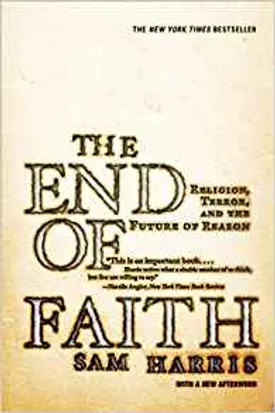The End of Faith: Religion, Terror, and the Future of Reason by Sam Harris
In 2004, author Sam Harris wrote “The End of Faith: Religion, Terror, and the Future of Reason”, a book with the goal of showing the world why we are in a time of unprecedented violence and terror, and how religion is at the root of it. Harris proposes a number of solutions that could help create a better future.
In the book’s introduction, Harris states that it is no longer possible to view religious doctrines as harmless private beliefs, or deal with faith as a legacy of a distant past; it simply plays too large a role in modern terrorism and conflict to be ignored. To illustrate this, he presents a number of case studies, showing how religious doctrines are used to motivate acts of terror, and how the concepts of religion and terror are linked. He also argues that faith is a type of “state-sponsored terror”, that is, acts of terror perpetrated in the name of God, and suggests that it can rarely be separated from violence.
The bulk of the book contains discussions and ideas that Harris argues will lead to a future of reason and peace, including the realization of the need for “better oversight and supervision of the modern world’s monotheistic religions”, a call to action in the form of “clarifying our moral higher and understanding the depths of our humanity”, and how “open-mindedness and dialogue can help to bridge differences between cultures”. He also examines various aspects of modern-day terrorism and its roots, such as the idea of a “clash of civilizations”, and suggests that one of the best ways to prevent further terror is to reach out to groups who are the most likely to be targeted by terrorist groups, and build relationships and understanding with them.
In addition, Harris uses the book to challenge many of the traditional beliefs about faith and morality, by demonstrating that beliefs can be immoral and conflicting, and should not be taken as absolute truths. He also argues that, in order for a society to remain healthy, it must embrace reason and question its beliefs, rather than continue to adhere to beliefs that are entrenched in tradition and religion.
The book culminates with an exploration of how an increased appreciation of science and reason, combined with a willingness to dialogue, can lead to a more peaceful world. Harris believes that, if the world is to find harmony, it must first learn how to properly question, debate and refine its beliefs, rather than simply accepting them blindly.
In conclusion, “The End of Faith” is an important book that ties together the worlds of science, religion and terrorism, making it an important read for anyone interested in better understanding the many connections between these seemingly disparate topics. By exploring the intimate links between faith and terror, Harris paints a thought-provoking and inspiring picture of a future in which reason and dialogue can lead to peace.

